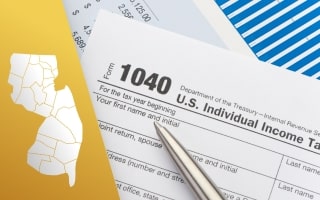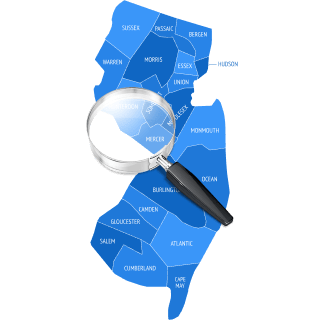Property Tax Records in New Jersey

When you purchase any type of property in New Jersey, you'll need to pay annual taxes to retain ownership of the home. The property taxes in New Jersey are among the highest in the country. While tax rates differ from county to county, the average rate is around 2.26%. Several counties in the state crest 3%. You may be able to reduce your annual New Jersey property taxes with an exemption or deduction.
You should receive your property tax bill in September each year. This bill will be separated into four quarterly payments, due every three months starting on February 1. Several factors determine your annual property taxes, including the tax rate in your county and your home's value.
If you have a large home, you'll likely pay high property taxes. Keep in mind that your taxes can increase significantly whenever you make improvements and renovations to your home. Local assessors calculate property values once every year.
More than 100 years before New Jersey became a state, homeowners were required to pay property taxes. In the 1670s, property owners were charged one-half of a penny for every acre of land they owned. In 1851, properties began to be assessed with a uniform structure that was based on the actual market value. This law meant that all types of properties were treated the same under the state's taxation guidelines.
Property Tax Assessment in New Jersey

As a homeowner, your New Jersey property taxes will be collected by the municipal assessor. If you include these taxes in your monthly mortgage payments, divide your annual bill by 12 to identify how much you'll pay every month. Otherwise, bills are paid across four installments that are due in February, May, August, and November. Your property taxes are based on the county rate for all taxing authorities and the value of your home.
In most states, current market values are estimated by county assessors. In comparison, this process is handled by the 565 municipalities in New Jersey. Assessors can use different methods to calculate the value of a home. Once your local assessor identifies the market value of your home, they can calculate what your annual tax bill will be.
Taxes are based on your home's total assessed value instead of its market value. In New Jersey, the assessed ratio is 80% of the market value.
If the market value of your home is $300,000, its assessed value will be $240,000. You may be able to reduce your home's assessed value with a property tax exemption. When calculating your annual property taxes, multiply your home's assessed value by your county's effective tax rate. If the tax rate in your county is 2.2%, you'll pay $5,280 in property taxes. The average tax rates in the most populous New Jersey counties are:
- Bergen County: 1.76%
- Middlesex County: 2.52%
- Essex County: 2.05%
- Hudson County: 2.17%
- Ocean County: 2.09%
Bergen County property taxes are low compared to other smaller counties. This is rare, as usually the most populated counties have the highest or among the highest taxes in a state.
Calculate New Jersey Taxes
A New Jersey property tax calculator is a valuable tool for homeowners and real estate investors looking to better understand how property taxes are calculated throughout the state. This tool allows users to input essential property details, such as municipality, assessed value, and any applicable exemptions, to estimate their annual tax assessment and liability. Because New Jersey has some of the highest property taxes in the nation and tax rates vary widely by municipality and county, a calculator helps provide a more accurate picture of your expected tax bill based on your specific location.
In addition to estimating your property taxes, a New Jersey property tax calculator can also help identify available exemptions and relief programs. The state offers several forms of property tax relief, including the Homestead Benefit Program and the Senior Freeze (Property Tax Reimbursement) Program, which reimburses eligible senior and disabled homeowners for property tax increases. Veterans, senior citizens, and individuals with disabilities may also qualify for additional deductions and credits.
using our property tax calculator.
New Jersey Property Tax Records: What Are They?

When you pay property taxes in New Jersey, your money is used to fund the budgeted expenditures of school districts, counties, and municipalities. Tax rates can change when the budgetary requirements are updated every year. Along with school systems, these revenues help pay for police, roads, fire departments, and other public services.
Because of how high property taxes in New Jersey are, it's recommended that you view tax records before you make an offer on a home. Tax records include a lot of helpful details about a property. For example, you can identify how much tax the property owner has paid annually. If the home has been renovated in recent years, you should be able to view in-depth descriptions of what these improvements entailed.
If you're interested in learning more about a property, every county in New Jersey makes tax records available to the public. The search criteria that you can use when trying to find tax records include property address and owner name. If you enter a partial address, you'll get a list of properties that correspond with the information you entered. The details that are included on New Jersey tax records include the following:
-
Block and lot numbers
-
Property address
-
District
-
Owner name
-
Square footage
-
Year built
-
Architectural style
-
Previous sales
-
Legal description
-
Current assessed value
-
Current market value
-
Around seven years of valuation history
-
Amount of property taxes
-
Details about home interiors
-
Zoning maps
-
Tax maps
Property Tax Exemptions and Deductions in New Jersey

If you live in New Jersey, you may be able to claim an exemption or deduction to reduce your annual property taxes. If you qualify for an exemption, it will reduce your property's assessed value by a certain amount. However, only a small subset of homeowners qualifies for these exemptions. New Jersey property tax exemptions can be complicated to qualify for. Here's a look at a few of them.
Tax Deduction for Seniors and Disabled Individuals: Based on the New Jersey Constitution, seniors and disabled individuals can claim a yearly $250 deduction from their property taxes. Seniors must be at least 65 years old to qualify for the exemption.
If you're a senior or disabled individual, your annual income must be less than $10,000. You also need to live in the home and own it to claim the deduction. To continue using this deduction, you need to reapply every year by March 1.
Tax Deduction for Veterans and Surviving Spouses: This tax deduction is also worth $250. It directly reduces your annual property taxes. If you're a war veteran or surviving spouse, you may qualify for this deduction. The deduction is also available to surviving spouses of people who died while on active duty or during a time of war. To qualify for this deduction, you must meet the following requirements:
- Citizenship
- Active wartime service in the U.S. Armed Forces
- Honorable discharge
- New Jersey residency
- Real property ownership
- Surviving spouse
Exemption for Disabled Veterans and Surviving Spouses: If you're a qualified war veteran with a service-connected disability, you may be able to obtain a 100% exemption on your annual property taxes. This exemption is also available to veterans who have a total disability. Keep in mind that the 100% exemption applies to the value of your home on the date you acquired it.
If a disabled veteran who has access to this exemption passes away, their surviving spouse may gain access to it. To qualify for the exemption, you need to meet the following requirements:
- Honorable discharge
- New Jersey citizenship
- Active wartime service
- File application with the local tax assessor
- Full property ownership
- Primary residence
- Certification from Veterans Affairs of total disability
The types of disabilities that qualify for this exemption include everything from total blindness to paraplegia.
How To Search Property Tax Records in New Jersey

There are a couple of options you can utilize when you're searching for property tax records in New Jersey. Since these records are available to the public, they aren't difficult to access. If you know where the home is located, simply look up "property tax records" with the name of the county. From here, you should be able to find your county's online database. Most of these databases allow you to search for tax records by inputting the property address, parcel ID, or owner name.
You can also access these records with a third-party platform like PropertyChecker. This website allows users to search for properties with parameters like parcel ID, owner's name, property address, email, and phone number. After you submit the info, you'll be able to view the following details about the property in question:
-
Records of any lien on the home
-
Building permit details
-
Foreclosure information
-
Comprehensive property details
-
Current and past property values
-
Neighborhood info
-
Property tax records
-
Owner name
-
Deeds
-
Loan records
-
Previous sales history
How To Appeal Property Taxes in New Jersey

While you should receive your tax bill in September, a Notice of Assessment will be sent to you at the beginning of February, which gives you time to appeal your home's assessed value. All New Jersey homeowners can file an appeal if they believe that the county has made a mistake.
Step 1: To win an appeal, you'll need to prove that your home's assessed value is unreasonable. You may need to request an appraisal from a third-party assessor before you attend an appeals hearing.
Step 2: If you decide to appeal your property taxes, you must fill out and file Form A-1. This form should be submitted to your County Board of Taxation.
In some counties, a filing fee must be paid. For example, Monmouth County charges anywhere from $5-$150 depending on the assessed valuation of your home.
You can choose to have legal representation at your hearing. During the hearing, the local assessor will likely be present to provide evidence of their decision. You'll also have the opportunity to show the evidence you've gathered.
Step 3: If you don't agree with the decision that the County Tax Board has made, you may be able to appeal to the Tax Court of New Jersey. Make sure you file the appeal within 45 days after the County Board makes its decision. If your home's assessed value is over $1 million, you can skip the previous steps and file your appeal with the Tax Court of New Jersey. New Jersey property tax appeals aren't an easy process, but if you're prepared, you can win the appeal.
How Property Tax Records Impact Real Estate Transactions in New Jersey

Property taxes in New Jersey are higher than they are in every other state. In most counties, the tax rate is at least double the national average, which is why these taxes factor into most real estate transactions. When someone wants to purchase a home in New Jersey, they'll likely consider property taxes.
In counties like Cape May and Bergen, the effective tax rate is lower than 2%. On the other hand, counties like Camden, Gloucester, and Salem have tax rates above 3%. Buyers might hesitate to purchase homes in counties with high tax rates. They may also seek concessions from sellers. In this scenario, the seller might pay some of the closing costs or make a few repairs before the transaction closes.
Property taxes also affect investors and their decisions on where to buy rentals. The purpose of any real estate investment is to gain profits through higher property values, rental income, and other sources. If the monthly expenses are higher than the rental income, the investor won't make any money.
If a homeowner in New Jersey doesn't pay their property taxes on time, their home can be taken through a tax sale. Most counties and cities host tax sales once every year. For example, the City of Elizabeth holds a tax sale in June for all delinquent municipal charges from the previous fiscal year. Investors can bid on these properties via online auctions.
If you attend one of these public actions, you won't bid on the title to the property. Instead, you'll be able to bid for a tax sale certificate, which involves the lien that was placed on the delinquent property. The winning bidder needs to make their payment immediately to take ownership of the tax lien. The lien holder must record their interest in the certificate within 90 days.
If you hold a tax sale certificate, you'll be able to collect taxes from the homeowner. Interest will continue to build until all taxes are paid. If the taxes remain unpaid after two years, you can foreclose on the property and take ownership of it.
Free New Jersey Property Tax Lookup
Tax Records Please wait...
Property Tax Guide
- Property Tax Records in New Jersey
- Property Tax Assessment in New Jersey
- New Jersey Property Tax Records: What Are They?
- Property Tax Exemptions and Deductions in New Jersey
- How To Search Property Tax Records in New Jersey
- How To Appeal Property Taxes in New Jersey
- How Property Tax Records Impact Real Estate Transactions in New Jersey
Instant Access to New Jersey Property Records
- Owner(s)
- Deed Records
- Loans & Liens
- Values
- Taxes
- Building Permits
- Purchase History
- Property Details
- And More!
Free New Jersey Property Tax Lookup
Tax Records Please wait...
Property Tax Guide
- Property Tax Records in New Jersey
- Property Tax Assessment in New Jersey
- New Jersey Property Tax Records: What Are They?
- Property Tax Exemptions and Deductions in New Jersey
- How To Search Property Tax Records in New Jersey
- How To Appeal Property Taxes in New Jersey
- How Property Tax Records Impact Real Estate Transactions in New Jersey